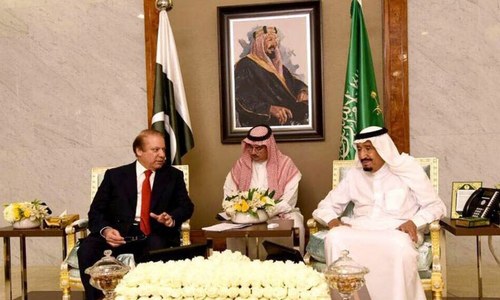ISLAMABAD: Prime Minister Nawaz Sharif on Monday launched a ‘mediation effort’ to resolve the rift between Qatar and other Gulf states.
PM Sharif, who arrived in Jeddah for a one-day trip, met King Salman bin Abdul Aziz.
According to the Press Information Department, the PM was received by Makkah Governor Prince Faysal bin Abdul Aziz. King Salman also hosted an Iftar reception in honour of the visiting delegation.
The prime minister is accompanied by Finance Minister Ishaq Dar, Adviser to the PM on Foreign Affairs Sartaj Aziz and Chief of the Army Staff General Qamar Javed Bajwa.
Bajwa accompanies Sharif; Kuwaiti emir leading similar fence-mending move
PM Sharif’s mission comes in tandem with several other initiatives aimed at resolving the Middle Eastern schism, with Kuwaiti emir Sabah Al-Ahmad Al-Jaber Al-Sabah spearheading a similar move. Saudi and Qatari delegations are, meanwhile, also holding talks in Washington DC, facilitated by the US.
Mr Sharif started his journey back home late on Monday night.
Although diplomatic observers are optimistic that a solution will soon be found, Arab countries allied with Saudi Arabia have so far taken a hard line on Qatar.
UAE Foreign Minister Anwar Gargash said in a recent interview that “there is nothing to negotiate” with Qatar.
Pakistan’s Foreign Office had earlier expressed its concern over the crisis unfolding in the Arab world, which had led Saudi Arabia, Bahrain, Egypt, Yemen and the UAE to sever ties with Qatar over allegations that the oil-rich island nation was sponsoring extremism and terrorism.
Foreign Office spokesman Nafees Zakaria had said: “Pakistan believes in unity among Muslim countries. We have made consistent efforts for its promotion.”
Unlike last year’s diplomatic crisis between Riyadh and Tehran, which PM Sharif had also attempted to defuse, a rift between Saudi Arabia and Qatar poses a bigger foreign policy challenge for Pakistan, which has strong political, economic and security ties with both sides.
In addition, the ruling Sharif family has historic relations with the ruling families in both Saudi Arabia and Qatar — after being ousted by a military coup in 1999, the Sharif family went into exile in Saudi Arabia, while the Qatari royal family is one of the Sharifs’ main benefactors.
In fact, the former Qatari prime minister’s letter in the Panama Papers case before the Supreme Court was a mainstay of the prime minister’s defence team.
There are worries that Pakistan would not be able to maintain its neutrality in the conflict for long.
Domestically, the government had been under pressure to stay out of the conflict and, instead, play its role in trying to defuse tensions between the two sides.
Last week, the National Assembly adopted unanimously a resolution calling on all states in the Gulf region to shun their differences.
“This house calls upon all countries to show restraint and resolve all differences through dialogue. This house also calls upon the government to take concrete steps towards forging unity amongst the Muslim Ummah in the region,” the resolution said.
The prime minister had announced his intention to mediate during his visit to Astana for the Shanghai Cooperation Organisation summit. “Since Pakistan enjoys good relations with Saudi Arabia, Iran and Qatar, we will try our best to resolve the differences between them,” PM Sharif had told journalists accompanying him.
Also last week, Abdul Hadi Al-Hajeri, a special emissary of the Qatari emir Sheikh Tamim bin Hamad Al-Thani, visited Pakistan along with a six member delegation.
During his two-day stay in Pakistan, Mr Hajeri, who is a frequent visitor and a close friend of the ruling family, met Prime Minister Sharif in Islamabad and Punjab Chief Minister Shahbaz Sharif in Lahore.
The foreign office spokesperson has already denied reports circulating in the foreign media that Pakistan plans to send any troops to Qatar, following Turkey’s decision to deploy its forces there.
Published in Dawn, June 13th, 2017
















































